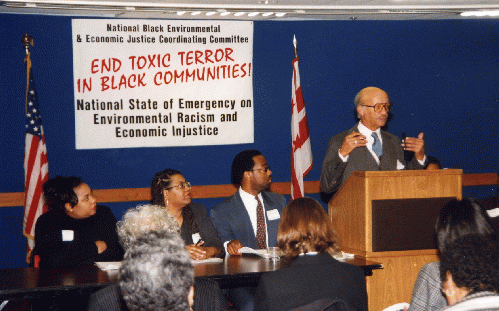
Black Leaders hold emergency meeting to address environmental racism threats in their communities
(Image by Robert D. Bullard) Details DMCA
Dumping in Dixie: Race, Class and Environmental Quality first hit bookstore shelves twenty-five years ago. It was the first book to chronicle environmental injustice struggles in African American communities from Texas to West Virginia. And for several years, Dumping in Dixie was the lone environmental justice book. Today, there are literally hundreds of environmental justice books in print covering a wide range of issues and topics. A big thank you to Westview Press for having the good sense and vision twenty-five years ago to see what environmental justice leaders saw, a huge information gap when it came to academic books that documented environmental inequality and environmental racism.
The publisher marketed the book as a textbook and it became a popular fixture in colleges and universities across the country. It was also used as a manual by grassroots environmental justice leaders to buttress their arguments against environmental racism. Here is the blurb Westview Press used to market the book:
"To be poor, working-class, or a person of color in the United States often means bearing a disproportionate share of the country's environmental problems. Starting with the premise that all Americans have a basic right to live in a healthy environment, Dumping in Dixie chronicles the efforts of five African American communities, empowered by the civil rights movement, to link environmentalism with issues of social justice. In the third edition, Bullard speaks to us from the front lines of the environmental justice movement about new developments in environmental racism, different organizing strategies, and success stories in the struggle for environmental equity."
The National Wildlife Federation tapped Dumping in Dixie with its 1990 Conservation Achievement Award in Science. I am still surprised (pleasantly) when people come up to me and let me know when they read the book and how it impacted their lives, careers and work. One can only imagine how wonderful that makes an author (teacher) feel--the ultimate compliment. Although Dumping in Dixie focused primarily on black communities in the southern United States struggling against the legacy of slavery, Jim Crow segregation, residential apartheid and environmental racism, the book's environmental justice framing was able to translate to larger race and class struggles in the United States and around the world. Many of these old EJ struggles continue to this day as new ones take on heightened urgency--like climate change and the call for a southern initiative on climate justice to address the unique legacy and vulnerability in the South.
The world is much different today than in 1990. Way back then the heart and soul of our messaging in Dumping in Dixie was "Black Communities Matter." Today, race and class still matter. All communities are still not created equal. Some communities have the wrong complexion for protection. And unfortunately, one's zip code is still a potent predictor of health and well-being--and is still a powerful determinant of who gets dumped on. Dixie is different. It is no accident the southern United States gave birth to the modern civil rights movement and the environmental justice movement. We have come a long way in our quest for environmental justice over the past quarter century. Yet, we have much more work to do to erase the growing race, income and wealth gap and ensure equal protection and environmental justice for all.





